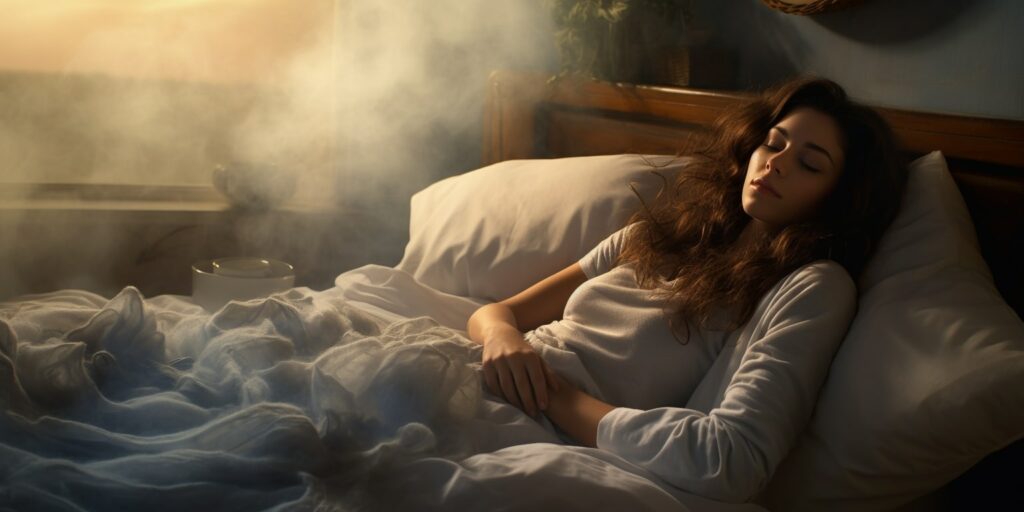There’s something eerily unsettling about waking up at 3 a.m. Suddenly, you’re wide awake, and the world outside is shrouded in darkness. You check your phone, and sure enough, it’s that peculiar hour again: 3 a.m. But why does this happen? Why do I wake up at this specific time?
It’s not just a coincidence or an instance of bad luck; there are actually scientific reasons behind this phenomenon. Your body has its own internal clock, known as the circadian rhythm, which regulates sleep-wake cycles, among other things.
Sometimes, factors such as stress, poor diet, or even certain medical conditions can disrupt our circadian rhythms, causing us to wake up during the wee hours of the morning. So, if you’ve ever wondered, “Why do I always wake up at 3 a.m.? ” Rest assured – it’s not just you, and there are legitimate explanations for it.
Understanding the Circadian Rhythm
Ever wonder why your body seems to function like clockwork? Why do you feel sleepy at certain times and wide awake at others? The answer lies in our biology, specifically, something called the circadian rhythm.
In layman’s terms, our circadian rhythm is like an internal body clock that regulates various physiological processes. It’s primarily influenced by light and darkness in an organism’s environment. This 24-hour cycle helps determine when we’re alert or sleepy.
Understanding how this works can shed some light on why you might be waking up at 3 am every day. When it gets dark, your eyes send a signal to a part of the brain known as the hypothalamus. Here, a command is sent out to release melatonin – a hormone that makes us feel tired.
Now here’s where things get interesting: under normal circumstances, melatonin levels stay high throughout the night and start dropping in the early morning hours – around 3 am for many people. So if you’re consistently waking up at this time, it could be because your melatonin levels are falling earlier than they should.
But don’t panic just yet! There could be other reasons for this early awakening as well, such as stress or underlying health conditions. If you’re struggling with sleep disturbances like these, it’s best to consult with a healthcare professional who can help pinpoint what might be going wrong.
Medical Causes of Waking Up at 3 AM
An array of medical conditions might be the culprit behind your consistent wake-up calls at 3 AM. The first one I’ll mention is sleep apnea. This sleeping disorder causes breathing to repeatedly stop and start throughout the night, which can lead to you waking up frequently.
- Sleep Apnea: You may not even realize it’s happening, but if you often feel tired even after a full night’s rest, this could be a sign of sleep apnea.
Another common cause for nocturnal awakenings is restless leg syndrome (RLS). It’s characterized by an uncomfortable sensation in your legs that often improves with movement. If you’re dealing with RLS, it might be compelling you to move and thus disrupt your sleep.
- Restless Leg Syndrome: Imagine feeling an irresistible urge to move your legs when you’re trying to get some shuteye – not ideal!
Now let’s talk about gastroesophageal reflux disease (GERD). This condition happens when stomach acid frequently flows back into the tube connecting your mouth and stomach (your esophagus), which can stir you from slumber.
- GERD: If heartburn and indigestion are keeping you awake at night, GERD could be the problem.
We can’t forget about anxiety disorders, either. Anxiety has a knack for keeping our minds racing with thoughts and worries that make it hard to fall asleep or stay asleep.
- Anxiety Disorders: If worry or fear are dominating your nighttime thoughts, anxiety may play a role in those unwanted 3 AM wake-up calls.
Lastly, there’s chronic pain. Conditions such as arthritis or fibromyalgia that cause ongoing discomfort can interrupt sleep patterns too.
- Chronic Pain: Unfortunately, there’s no snooze button on pain; chronic conditions may keep nudging you awake throughout the night.
Each of these conditions comes with its own unique set of challenges and symptoms. If you’re frequently waking up at 3 AM, it’s worth discussing these possibilities with your doctor to help identify potential treatments or lifestyle changes that could improve your sleep quality.
Psychological Reasons for Nightly Interruptions
Ever wonder why you’re jolted awake at 3 a.m., eyes wide open? I’ve been there, too. Often, it’s not just a random disturbance but could be linked to certain psychological reasons. Let’s delve into some of these.
Stress is a common culprit behind those unwelcome 3 am wake-up calls. When we’re stressed, our body releases hormones like cortisol and adrenaline that can keep us alert and awake, even in the wee hours. This can result in what’s known as sleep maintenance insomnia – essentially waking up in the middle of the night and having difficulty returning to sleep.
Next up on our list is anxiety. Anxiety disorders can significantly disrupt your sleep patterns, causing you to wake up during the night. It’s like your brain is running on overdrive with worry or fear about something – be it past events or future uncertainties – making it difficult to stay asleep.
Another psychological reason might be depression. Changes in sleep patterns are a key symptom of this mental health disorder, with early morning awakenings being notably common among those suffering from depression.
Lastly, let’s talk about nightmares and night terrors – these menacing dreams can abruptly rouse you from your slumber. While they’re more often seen in children than adults, nightmares can occur at any age, especially when under significant stress or after a traumatic event.
- Stress: Releases hormones that keep you alert
- Anxiety Disorders: Disruptive thoughts make it hard to stay asleep
- Depression: Early morning awakenings are common symptoms
- Nightmares/Night Terrors: Stressful dreams that wake you suddenly
Understanding these psychological triggers is the first step towards overcoming them and reclaiming peaceful nights’ rest!
The Connection Between Diet and Sleep Patterns
Ever wonder why you’re mysteriously waking up at 3 a.m.? Believe it or not, your diet could be the culprit. The foods and when we eat can significantly impact our sleep patterns.
Let’s start with caffeine – a well-known enemy of sleep. Consuming coffee, tea, or chocolate – which are all high in caffeine – late in the day can keep you tossing and turning at night. You might think that an afternoon cup of java isn’t affecting your sleep, but here’s an eye-opening fact: caffeine can stay in your system for up to six hours!
Next on the list is alcohol. Sure, it might make you drowsy initially but don’t be fooled! Alcohol actually disrupts your REM cycle, often causing people to wake up prematurely – yes, even at that pesky 3 am mark.
And let’s not forget sugar. Eating sweets or drinking sugary beverages close to bedtime can cause a surge in blood sugar levels followed by a drop during sleep. This seesaw effect may lead to middle-of-the-night awakenings.
Furthermore, spicy and fatty foods deserve mention, too. These foods can trigger indigestion or acid reflux issues that may disturb your slumber.
Finally, there’s timing to consider. Eating heavy meals close to bedtime forces your body to digest when it should be resting, which may also interfere with sound sleep.
So next time you find yourself staring at the clock at 3 am, take a moment to consider what was on your dinner plate!
Role of Electronic Devices in Disturbing Sleep Cycle
I’ve found that our modern gadgets, particularly electronic devices like smartphones and laptops, significantly disrupt our sleep cycles. Let me explain why.
It’s primarily due to the blue light these devices emit. Exposure to this type of light close to bedtime can delay the release of melatonin, the hormone responsible for making us sleepy. A study by Harvard Medical School suggests that blue light suppresses melatonin twice as much as green light, shifting circadian rhythms by up to 3 hours.
Additionally, many of us develop an unhealthy habit of checking emails or scrolling through social media before bed. This keeps our minds alert when we should be winding down for sleep.
There’s also the issue of electromagnetic radiation from wireless communication features on these devices. According to The World Health Organization (WHO), exposure to low-frequency electric and magnetic fields affects human health and may cause insomnia.
Here’s a quick rundown:
- Blue Light: Delays release of melatonin
- Late Night Usage: Keeps mind alert
- Electromagnetic Radiation: May cause insomnia
One more thing worth mentioning is how sounds from electronic devices often interrupt our sleep patterns. Unexpected notifications or calls during sleeping hours can jolt you awake at odd hours, including- you guessed it – 3 a.m.!
Reducing exposure to electronic devices before bedtime could be one key step toward improving your nocturnal wakefulness issues!
Effective Strategies to Maintain Healthy Sleep Habits
If you consistently wake up at 3 a.m., it’s time to reassess your sleep habits. I’ve been in your shoes, and I can tell you that a few tweaks here and there can make a world of difference. Let’s take a look at some effective strategies to maintain healthy sleep habits.
To start with, establishing a regular sleep schedule is key. Aim to go to bed and wake up at the same time every day – yes, even on weekends! Your body has an internal clock known as the circadian rhythm, which thrives on consistency. Constantly changing your bedtime or wake-up time throws this rhythm off balance, leading to poor quality sleep.
Next, let’s talk about creating the right environment for restful sleep. You’d be surprised how much light levels can impact your ability to drift off. Light signals our brains that it’s time to be awake and alert, whereas darkness signals it’s time for rest and repair. So, before bedtime, try dimming lights or using blackout curtains in your bedroom.
Just as important is keeping tech out of the bedroom – trust me on this one! The blue light emitted from smartphones, tablets, and computers suppresses melatonin (the sleep hormone), making it harder for us to fall asleep – not ideal if you’re already struggling!
Lastly, don’t underestimate the power of diet & exercise to maintain healthy sleeping patterns. Regular physical activity helps regulate your body’s natural wake-sleep cycle while avoiding food & drinks high in caffeine or sugar close to bedtime prevents unwanted spikes in energy.
By incorporating these tips into everyday life, getting a good night’s rest becomes less elusive than you might think!
- Keep consistent bedtimes
- Adjust lighting conditions
- Limit the use of electronics
- Incorporate regular physical activity
- Watch what you eat & drink close to bedtime
Remember, these are general tips. Everyone is different, and what works for one person might not work for another. It’s all about finding what works best for you when it comes to maintaining healthy sleep habits.
Implementing Relaxation Techniques for Uninterrupted Sleep
I’ve been there, staring at the ceiling at 3 a.m., counting sheep, and doing every other trick in the book. It’s not fun. But I’ve discovered some relaxation techniques that can help you sleep peacefully and stay there until morning.
It all starts with your pre-bedtime routine- you know, those things you do before hitting the hay. Certain activities can send signals to your brain that it’s time to wind down.
- Listening to calming music or nature sounds
- Reading a book (avoid screens – they stimulate your brain)
- Taking a warm bath
- Meditating or doing some light stretching
These actions gently remind our body and mind that it’s time to relax and prepare for sleep.
Next is creating an environment conducive to sleeping. That means ensuring the room is dark enough – blackout curtains can be handy here. According to sleep.org, the temperature should also be on the cooler side, around 60-67 degrees Fahrenheit. Noise can be a big factor, too – consider using earplugs or white noise machines if required.
Now onto breathing exercises – they’re quite effective when we’re talking about relaxing our body for sleep. One technique I’ve found particularly helpful is called “4-7-8”. Here’s how it works:
- Breathe in through your nose quietly for a count of 4.
- Hold your breath for a count of 7.
- Exhale slowly through your mouth for a count of 8.
- Repeat this cycle four times.
The last tip? Progressive muscle relaxation! This involves tensing different muscles and gradually releasing them, which helps promote physical relaxation.
Here’s my suggestion: start from either end (feet or head) and work toward the other end, spending a few seconds on each muscle group along the way. It could be your toes, legs, abdomen, hands, arms, or face – focus on each part separately, and you’ll feel the tension melting away.
There is no one-size-fits-all when it comes to relaxation techniques for sleep. It takes a bit of trial and error to find what works best for you. But once you do, those 3 a.m. wake-ups will become a thing of the past.
Conclusion: Achieving Restful Nights
At the end of our journey, it’s clear that waking up at 3 am isn’t just a random occurrence. It can be a signal from your body that something needs to change.
The reasons for this nocturnal wakefulness can vary. They might include stress, anxiety, or health conditions such as sleep apnea and insomnia. Even factors like diet and lifestyle habits can play a significant role in disturbing your sleep cycle.
So, what’s the solution? Understanding your personal triggers is key. One way to do this is to keep a detailed sleep journal to track patterns over time.
- Note down what you ate or drank before bedtime
- Record any stressful events during the day
- Document how many hours you slept each night
This information will give us valuable insights into why we’re waking up at 3 am.
Secondly, developing good sleeping habits is crucial in achieving restful nights:
- Stick to consistent sleep schedules
- Make sure your bedroom environment promotes relaxation
- Consider incorporating relaxation techniques such as deep breathing exercises or yoga before bed
Lastly, seeking professional help may be necessary if self-help strategies aren’t working. A healthcare professional could provide further guidance and treatment options specific to your situation.
By addressing these issues head-on with knowledge and proactive steps, I believe that we all have the potential to overcome those pesky 3 a.m. wake-up calls and achieve restful nights. Remember – our bodies are designed for optimal function with adequate rest; it’s high time we start giving them what they need!



